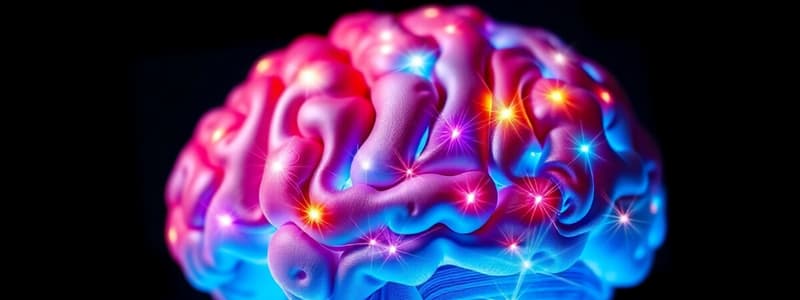Podcast
Questions and Answers
What is the initial action required to produce the right letter shapes for writing?
What is the initial action required to produce the right letter shapes for writing?
- Acquire knowledge from experience
- Move our hands (correct)
- Transform knowledge into actions
- Store letter shapes in memory
Which cognitive process is NOT involved in writing letters according to the content provided?
Which cognitive process is NOT involved in writing letters according to the content provided?
- Acquiring knowledge
- Receiving auditory feedback (correct)
- Storing knowledge
- Transforming knowledge
What role does experience play in the task of writing letters?
What role does experience play in the task of writing letters?
- It provides the necessary knowledge for performing the task (correct)
- It limits hand movement accuracy
- It replaces the need for knowledge
- It complicates the writing process
Which of the following statements best describes the process involved in writing letters?
Which of the following statements best describes the process involved in writing letters?
What is the importance of moving our hands when learning to write letters?
What is the importance of moving our hands when learning to write letters?
Who is credited with forming the first journal for psychological research?
Who is credited with forming the first journal for psychological research?
Which of the following best defines the focus of psychology according to structuralism?
Which of the following best defines the focus of psychology according to structuralism?
What year was the first journal for psychological research established?
What year was the first journal for psychological research established?
Which psychologist is primarily associated with the development of structuralism?
Which psychologist is primarily associated with the development of structuralism?
What is a notable characteristic of structuralism as defined by Wundt?
What is a notable characteristic of structuralism as defined by Wundt?
What aspect does this theory primarily focus on regarding conscious activity?
What aspect does this theory primarily focus on regarding conscious activity?
Which of the following statements is true about the theoretical inspiration mentioned?
Which of the following statements is true about the theoretical inspiration mentioned?
Which characteristic distinguishes this theory from other theories of consciousness?
Which characteristic distinguishes this theory from other theories of consciousness?
What is the primary interest of this theoretical perspective?
What is the primary interest of this theoretical perspective?
How does this theory view the relationship between behavior and biology?
How does this theory view the relationship between behavior and biology?
Who is considered one of the notable proponents of behaviorism alongside John Watson?
Who is considered one of the notable proponents of behaviorism alongside John Watson?
What is the primary focus of operant conditioning as defined by B.F. Skinner?
What is the primary focus of operant conditioning as defined by B.F. Skinner?
Which of the following methods is NOT associated with operant conditioning?
Which of the following methods is NOT associated with operant conditioning?
Which psychologist is primarily credited with the development of operant conditioning?
Which psychologist is primarily credited with the development of operant conditioning?
Which statement best describes the relationship between rewards and behavior in operant conditioning?
Which statement best describes the relationship between rewards and behavior in operant conditioning?
Who is known as the 'Father' of behaviourism?
Who is known as the 'Father' of behaviourism?
What is the primary focus of psychology according to behaviourism?
What is the primary focus of psychology according to behaviourism?
In what year did John B. Watson publish his influential article on behaviourism?
In what year did John B. Watson publish his influential article on behaviourism?
Which of the following statements best represents Watson's view on psychology?
Which of the following statements best represents Watson's view on psychology?
Which of the following is most aligned with behaviourist principles?
Which of the following is most aligned with behaviourist principles?
What is a significant disadvantage of a restricted view in research?
What is a significant disadvantage of a restricted view in research?
What can be a consequence of missing important behavior in research?
What can be a consequence of missing important behavior in research?
Why is it important for researchers to avoid a very restricted view?
Why is it important for researchers to avoid a very restricted view?
How might a researcher attain a more holistic perspective in their study?
How might a researcher attain a more holistic perspective in their study?
What effect does focusing solely on a limited scope have on the research findings?
What effect does focusing solely on a limited scope have on the research findings?
Flashcards
Hand Movements
Hand Movements
The physical act of forming letter shapes with our hands.
Knowledge Acquisition
Knowledge Acquisition
Gathering information from our experiences.
Knowledge Storage
Knowledge Storage
Storing the knowledge we've learned for future use.
Knowledge Transformation
Knowledge Transformation
Signup and view all the flashcards
Knowledge Application
Knowledge Application
Signup and view all the flashcards
Structuralism
Structuralism
Signup and view all the flashcards
What was the first psychology journal?
What was the first psychology journal?
Signup and view all the flashcards
Who is Wilhelm Wundt?
Who is Wilhelm Wundt?
Signup and view all the flashcards
How does structuralism define psychology?
How does structuralism define psychology?
Signup and view all the flashcards
What is introspection?
What is introspection?
Signup and view all the flashcards
Functionalism
Functionalism
Signup and view all the flashcards
Darwin's Theory of Evolution
Darwin's Theory of Evolution
Signup and view all the flashcards
Biological Significance of Consciousness
Biological Significance of Consciousness
Signup and view all the flashcards
Cognitive Psychology
Cognitive Psychology
Signup and view all the flashcards
Function over Structure
Function over Structure
Signup and view all the flashcards
Who is John B Watson?
Who is John B Watson?
Signup and view all the flashcards
What is Behaviourism?
What is Behaviourism?
Signup and view all the flashcards
What was Watson's influential article?
What was Watson's influential article?
Signup and view all the flashcards
What is the subject matter of Behaviourism?
What is the subject matter of Behaviourism?
Signup and view all the flashcards
What is the focus of Behaviourism?
What is the focus of Behaviourism?
Signup and view all the flashcards
Restricted Observation
Restricted Observation
Signup and view all the flashcards
Missing Important Behavior
Missing Important Behavior
Signup and view all the flashcards
What is Operant Conditioning?
What is Operant Conditioning?
Signup and view all the flashcards
Who was B.F. Skinner?
Who was B.F. Skinner?
Signup and view all the flashcards
Who was Edward Thorndike?
Who was Edward Thorndike?
Signup and view all the flashcards
What is Instrumental Conditioning?
What is Instrumental Conditioning?
Signup and view all the flashcards
Who are the proponents of Operant/Instrumental Conditioning?
Who are the proponents of Operant/Instrumental Conditioning?
Signup and view all the flashcards
Study Notes
Module Outcomes and Aims
- Cognitive psychology introduces basic theory, research findings, and investigative methods.
- Students will be able to describe important theories and research findings.
- The course covers key theoretical and research findings.
- Development skills covered include analysis, communication, critical thinking, independent working, and research skills.
Cognitive Psychology
- Focuses on mental processes (thinking and knowledge).
- Investigates how mental processes are organized and coordinated.
- A subfield of psychology focusing on thinking and knowledge.
Cognition
- Occurs throughout various activities, like listening to a lecture.
- Includes acquisition, storage, transformation, and use of knowledge.
What is Cognition?
- Cognition is acquiring, storing, transforming, and using knowledge.
- Cognition is present across species but this study will focus on human cognition.
Example: Video Viewing and Recall
- Watching a video involves creating an internal representation.
- Memory access and retrieval are utilized.
- Mental processes include language use, auditory and visual inputs.
- Linking inputs to prior knowledge facilitates recall.
- Representing information involves storage, recall and conversion into a linguistic form to be written down.
Major Topics in Cognitive Psychology
- Perception
- Attention
- Memory
- Learning
- Language
- Thinking
- Reasoning
- Problem Solving
- Consciousness
Implications for Other Fields
- Cognitive research applies to many fields, including psychology, law, computer systems and instructional design.
- Application can be observed in understanding brain disorders, improving study habits and more.
Wilhelm Wundt (1832-1920)
- Considered the "father" of experimental psychology.
- Established the first formal psychology laboratory at the University of Leipzig in 1879.
- Established psychology as a separate scientific discipline.
- Founded the first journal for psychological research in 1881.
Structuralism
- Developed by Wundt.
- Studies immediate experience.
- Analyzes consciousness into basic elements like ideas and sensations.
- Employs introspection (examining one's own thoughts and feelings).
Wundt - Introspection
- In Wundt’s laboratory, a subject (e.g., eating an apple) would report sensations like "sweet, crisp, cold".
- The goal was to isolate the experience by describing the "mental processes" during the action rather than the object of the experience itself.
William James (1842-1910)
- A pioneering American psychologist and philosopher.
- Emphasized psychology as a functional science.
- Focused on how the mind functions, how individuals interact within their environment.
- Introduced the concept of the "stream of consciousness".
James-Lange Theory of Emotion
- Emotions result from physiological changes followed by interpretation.
- Event → arousal → interpretation → emotion.
- Psychological changes follow an event and are then interpreted as an emotion.
Functionalism
- Influenced by Darwin's theories.
- Emphasizes the purpose and function of conscious mental activity.
- Investigates how mental processes help individuals adapt to their environments
John B. Watson (1878-1958)
- Father of Behaviourism.
- Argued that psychology's subject matter should be observable behavior.
- Focused on learning and environments, not mental states.
Behaviourism
- Focuses on observable behaviours.
- Does not focus on mental events because they cannot be directly accessed.
Operant Conditioning (B.F. Skinner)
- Learning through rewards and punishments.
- Learning occurs when a behavior is followed by a consequence.
- Positive reinforcement, negative reinforcement, positive punishment, and negative punishment.
The Cognitive Revolution
- A reaction against behaviorism.
- Started in the 1950s.
- Focuses on the role of mental processes in behavior.
- Combines developments in computer science, linguistics, and other disciplines.
- Intellectual movement emphasizing the study of cognitive processes (memory, perception, judgement).
Scientific Method in Psychology
- Includes experimentation, observation, and case studies as methods for research.
Steps in Experimentation
- Defining the problem and formulating a hypothesis.
- Designing the experiment.
- Conducting the experiment.
- Evaluating the hypothesis through data analysis.
- Communicating the conclusions.
Experimental Cognitive Psychology
- Experiments in controlled laboratory conditions.
- Focus on healthy participants, unlike other types of cognitive studies.
- Limitations - results may not perfectly reflect the real world because the environment is highly controlled.
Ecological Validity
- The degree to which experimental results can be generalized to real-life settings.
- A concern with lab experiments in cognitive psychology.
Observation
- Involves observing participants in their natural environment (overt observation).
- Involves observing participants without their knowledge (covert observation, e.g., structured observation for data collection).
- Useful in situations where manipulating variables or controlling factors is not possible or ethical (covert observation).
Structured Observation
- Researchers develop a structured coding scheme beforehand.
- Observations are a quantitative, rather than qualitative, data source.
Case Studies
- Often focus on brain-damaged individuals to understand the relationship between the brain and cognitive functions.
- Investigates performance patterns with intact and impaired cognitive functions.
- Attempts to build a general theory from observing specific cases.
- Focuses on single or double dissociations (different behaviours show different performances).
Cognitive Neuroscience
- The study of the neural substrates (biological mechanisms) of mental processes.
- Employs brain-imaging techniques.
- Investigating where and when cognitive processes occur.
Summary
- Cognitive psychology covers a wide range of mental activities (e.g., perception, thinking).
- Built on earlier psychological ideas and is now a multidisciplinary field.
- Uses various methods and techniques.
Studying That Suits You
Use AI to generate personalized quizzes and flashcards to suit your learning preferences.




